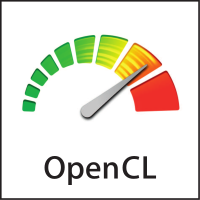ONLINE: OpenCL Programming for Intel FPGAs
| Date: | Thursday, April 23, 15:00 - Friday, April 24, 2020, 19:00 CEST | ||||||||||||
|---|---|---|---|---|---|---|---|---|---|---|---|---|---|
| Location: | ONLINE | ||||||||||||
|
Contents: |
This course will be delivered as an ONLINE COURSE for remote participation because of the COVID-19 measures enforced by most European governments. REGISTRATION is strictly NECESSARY since the details to access the online course will be provided to the registered and accepted attendees only. As the lecturer is teaching from the West Coast of the USA, we had to shift the course to 15:00 - 19:00 CET. FPGAs can help accelerate many of the core data center workloads that process the growing volume of data that our hyper-connected world creates. They can be reprogrammed in a fraction of a second with a datapath that exactly matches your workload’s key algorithms. This versatility results in a higher performing, more power efficient, and well utilized data center – lowering your total cost of ownership. FPGAS can be connected directly to processors, memories, networks, and numerous other interfaces. Traditionally, FPGAs require deep domain expertise to program for, but Intel is investing in significantly simplifying the development flow and enable rapid deployment across the data center. This course offered by Intel in cooperation with LRZ gives a high-level overview of FPGAs, what they are, why they are so important as accelerators, and how they can be programmed using OpenCL. This course contains both lecture and lab exercises to help gain familiarity with OpenCL Programming for Intel FPGAs. Agenda23 April 2020, 15:00-19:00: Introduction to OpenCL Programs for Intel FPGAs, Part I24 April 2020, 14:00-15:00: Ask Intel Webex Session24 April 2020, 15:00-19:00: Introduction to OpenCL Programs for Intel FPGAs, Part IIThe OpenCL™ standard is a standard for writing parallel programs for heterogeneous systems. With the Intel® FPGA SDK for OpenCL™ software technology, OpenCL program constructs are synthesized into custom logic for optimal acceleration on FPGA devices. This lecture introduces the basic concepts of parallel computing. It covers the constructs of the OpenCL standard and the Intel FPGA design flow that automatically convert kernel C code into hardware that interacts with the host. In hands-on labs, you’ll write programs to run in the Intel FPGA Emulation Platform for OpenCL™ software. OpenCL and the OpenCL logo are trademarks of Apple Inc. used by permission by Khronos. After this lecture you will be able to:
The following content will be offered in a separate online course (tbd):Optimizing OpenCL Programs for Intel FPGAsThis lecture covers optimization techniques to implement high performance OpenCL™ applications on FPGAs. We'll use various debug & analysis tools available in the Intel® FPGA SDK for OpenCL™ software technology to boost performance of OpenCL kernels. The first half of the lecture focuses on the optimization of single work-item kernels & the utilization of channel constructs & OpenCL kernel pipes. The second half of the lecture focuses on the optimization of NDRange kernels & the effective utilization of FPGA memory resources. Throughout the lecture we will discuss good coding practices for FPGAs & tool features to improve OpenCL kernel performance on FPGAs. After this lecture you will be able to:
Please use your own laptop (with an ssh client installed) for the hands-on sessions!
|
||||||||||||
| Prerequisites | Basic understanding of the C programming language, some understanding of the OpenCL standard is useful, but not necessary | ||||||||||||
|
The content level of the course is broken down as:
|
|||||||||||||
| Language: | English | ||||||||||||
| Lecturer: | Marlon Price (Intel) | ||||||||||||
| Registration: |
Via the LRZ registration form. Please choose course HFPG1S20. Please note: This course is offered in cooperation with Intel Corp. Germany. Some of your personal data will be transferred to Intel (first name, surname, institution, faculty, email, course). The legal basis is in accordance with Article 6(1)(b) GDPR. Please see also our data protection notice (in German: https://www.lrz.de/datenschutzerklaerung/). |
||||||||||||
| Hands-on: |
Will be offered via the Webex Training platform.. |
||||||||||||
| Contact: | Dr. Volker Weinberg (LRZ) | ||||||||||||
| Fee: | The online course is free of charge for people from academia and industry. |


